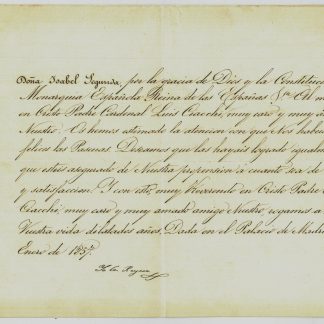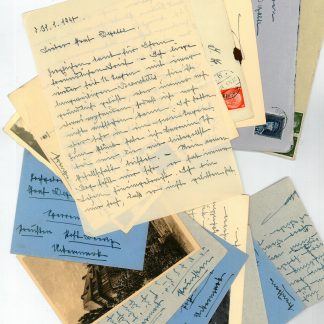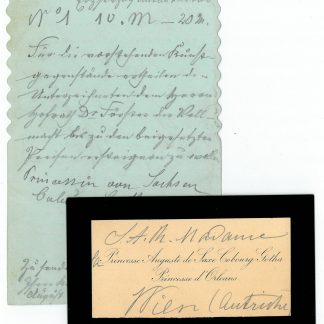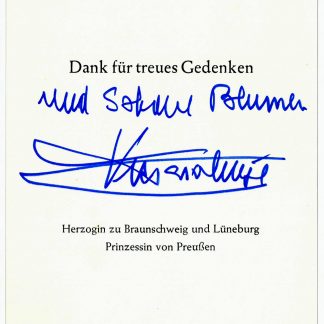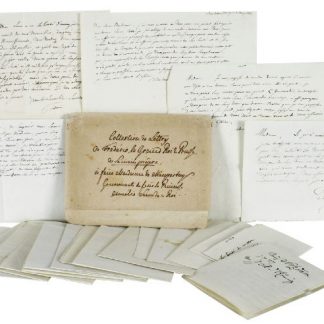Inquiring about the well-being of his favourite sister, Princess Anna Amalia
19 autograph letters signed and 1 letter signed ("Federic").
Mostly 4to. 23 ff. 4 letters on halved sheets; mostly folded. Addendum.
€ 98,000.00
Highly interesting collection of personal letters from the last years of the King's life. In French, to Eléonore de Maupertuis, lady-in-waiting to Princess Anna Amalia of Prussia, Frederick's youngest sister. Eléonore was the daughter of the well-esteemed Prussian diplomat, scholar, and translator Kaspar Wilhelm von Borcke. In 1744 she had married the French mathematician and astronomer Pierre-Louis Moreau de Maupertuis, also a close confidant of Frederick's and head of the Prussian Academy of Science. After her husband's death in 1759 she concentrated on her office in the household of the Princess.
Since 1756 Anna Amalia of Prussia was Abbess of the Quedlinburg Convent but spent most of her time in Berlin. She is mainly remembered for her alleged affair with the Prussian officer and adventurer Frederick von der Trenck. While the historical truth of this anecdote cannot be proven, she was undoubtedly - and more importantly - one of the 18th century's few female composers of note. Her music collection ("Amalienbibliothek") contains many important prints and manuscripts, including the autograph of Johann Sebastian Bach's Brandenburg Concerts. She spent her last years in seclusion at Berlin, always remaining in close contact with her brother, who visited her regularly. She survived Frederick's death on 17 August 1786 by just a few months, passing away on 30 March 1787 (cf. MGG I, 486f. and T. Debuch, Anna Amalia von Preußen, Berlin 2001).
There are but few sources for the life of Anna Amalia, many of which are dubious (such as Trenck's autobiography) or focus on Frederick the Great (such as the diaries of Count Lehndorff). Thus, the King's present letters to Eléonore de Maupertuis constitute a unique source for the last years of the Princess. They reflect Frederick's concern for Amalia's health after she suffered a stroke in 1773 and underscore the close relationship between the siblings: "Ma cher Madame, J'ai non recours a Vous pour ne point fatiguér ma bonne Soeur, Com(m)e je suis obligé de ma rendre demain au Parc pour des affaires je me propose des profités en ces Voisinages pour rendre visite a ma bonne Soeur [...]" (Charlottenburg, 2 May 1783).
"Je Vous prie Ma chere Madame, de Conjurer ma Soeur en mon nom de Voulloir prendre quelque Medecine, pour Luy facillitér L'expectoration [...]" (n. d.).
"Voici ma bonne Madame deux Sortes de Tabac pour ma bonne Soeur [...]" (n. d.).
"Je vous prie Ma chere Madame, de m'envoyer Le Nom de Soupes que Ma Soeur mange avant dinér, et une Liste des plats qu'elle aime et qui convienent le mieux en Sa Santé [...]" (n. d.).
"Je vous suis bien obligé, des bonnes nouvelles que vous me donnez de la Santé de la Principe ma Soeur, par votre lettre endate d'hier [...]" (6 March 1785).
Almost all letters close with the words "Votre (tres humble) Serviteur Federic". Most of the present letters are a quarter or half page in length and undated; a few are dated only by day but not year ("ce 6 May", "ce 22", "ce 25 Juin", etc.). One bears a note by another hand on the reverse ("[...] Potzdam, 1777, Von I. M. d. König"). Only two are dated in full: "Charlottenburg ce 2 May 1783" and "a Potsdam le 16 de Mars 1785". This last letter is written by a scribe's hand, bearing only an autograph postscript and signature by the King. This is also the only letter formally addressed "à la Gouvernante de Maupertuis, neé de Borck, à Berlin". Content and form, however, prove that all letters are from the same time and to the same recipient.
All letters written in brown ink on fine, clean laid paper, most with posthorn watermark. Includes a browned folio sheet (watermark St. Wolfgang, pointing to Georg Friedrich Meyer's Röthenbach paper mill) with late 18th-c. caption: "Collection de Lettres de Fredéric le Grand Roi de Prusse, de Sa main propre; à feüe Madame de Maupartuis Gouvernante de feüe la Princesse Amélie Soeur de ce Roi".
An exceptionally well-preserved collection.


